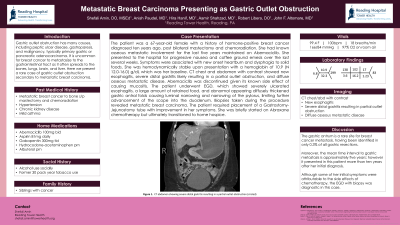Back


Poster Session D - Tuesday Morning
Category: Stomach
D0695 - Metastatic Breast Carcinoma Presenting as Gastric Outlet Obstruction
Tuesday, October 25, 2022
10:00 AM – 12:00 PM ET
Location: Crown Ballroom

Has Audio

Shefali Amin, DO, MSEd
Reading Tower Health
Reading, PA
Presenting Author(s)
Shefali Amin, DO, MSEd1, Anish Paudel, MD2, Hira Hanif, MD3, Aamir Shahzad, MD1, Robert Libera, DO1, John F. Altomare, MD4
1Reading Tower Health, Reading, PA; 2Tower Health - Reading Hospital, Reading, PA; 3Reading Tower Health, West Reading, PA; 4Digestive Disease Associates, Reading, PA
Introduction: Gastric outlet obstruction has many causes, including peptic ulcer disease, gastroparesis, and malignancy, typically primary gastric or pancreatic adenocarcinoma. It is uncommon for breast cancer to metastasize to the gastrointestinal tract as it often spreads to the bones, lungs, brain, and liver. Here we present a rare case of gastric outlet obstruction secondary to metastatic breast carcinoma.
Case Description/Methods: The patient was a 67-year-old female with a history of hormone-positive breast cancer diagnosed ten years ago, post bilateral mastectomy and chemoradiation. She had known osseous metastatic involvement for the last five years maintained on Abemaciclib. She presented to the hospital for progressive nausea and coffee ground emesis over the last several weeks. Symptoms were associated with a new onset of heartburn and dysphagia to solid foods. She was hemodynamically stable upon presentation with a hemoglobin 10.9 (N 12.0-16.0) g/dL which was her baseline. CT chest and abdomen with contrast showed new esophagitis, severe distal gastritis likely resulting in a partial outlet obstruction, and diffuse osseous metastatic disease. Abemaciclib was discontinued given its known side effect of causing mucositis. The patient underwent EGD, which showed severely ulcerated esophagitis, a large amount of retained food, and abnormal appearing diffusely thickened gastric antral folds causing luminal narrowing and narrowing of the pylorus, limiting further advancement of the scope into the duodenum. Biopsies taken during the procedure revealed metastatic breast carcinoma. The patient required placement of a Gastrostomy-Jejunostomy tube with improvement in her symptoms. She was briefly started on Abraxane chemotherapy but ultimately transitioned to home hospice.
Discussion: The gastric antrum is a rare site for breast cancer metastasis, having been identified in only 0.3% of all gastric resections. Moreover, the mean time interval to gastric metastasis is approximately five years; however it presented in this patient more than ten years after her initial diagnosis. Although some of her initial symptoms were attributable to the side effects of chemotherapy, the EGD with biopsy was diagnostic in this case.
Disclosures:
Shefali Amin, DO, MSEd1, Anish Paudel, MD2, Hira Hanif, MD3, Aamir Shahzad, MD1, Robert Libera, DO1, John F. Altomare, MD4. D0695 - Metastatic Breast Carcinoma Presenting as Gastric Outlet Obstruction, ACG 2022 Annual Scientific Meeting Abstracts. Charlotte, NC: American College of Gastroenterology.
1Reading Tower Health, Reading, PA; 2Tower Health - Reading Hospital, Reading, PA; 3Reading Tower Health, West Reading, PA; 4Digestive Disease Associates, Reading, PA
Introduction: Gastric outlet obstruction has many causes, including peptic ulcer disease, gastroparesis, and malignancy, typically primary gastric or pancreatic adenocarcinoma. It is uncommon for breast cancer to metastasize to the gastrointestinal tract as it often spreads to the bones, lungs, brain, and liver. Here we present a rare case of gastric outlet obstruction secondary to metastatic breast carcinoma.
Case Description/Methods: The patient was a 67-year-old female with a history of hormone-positive breast cancer diagnosed ten years ago, post bilateral mastectomy and chemoradiation. She had known osseous metastatic involvement for the last five years maintained on Abemaciclib. She presented to the hospital for progressive nausea and coffee ground emesis over the last several weeks. Symptoms were associated with a new onset of heartburn and dysphagia to solid foods. She was hemodynamically stable upon presentation with a hemoglobin 10.9 (N 12.0-16.0) g/dL which was her baseline. CT chest and abdomen with contrast showed new esophagitis, severe distal gastritis likely resulting in a partial outlet obstruction, and diffuse osseous metastatic disease. Abemaciclib was discontinued given its known side effect of causing mucositis. The patient underwent EGD, which showed severely ulcerated esophagitis, a large amount of retained food, and abnormal appearing diffusely thickened gastric antral folds causing luminal narrowing and narrowing of the pylorus, limiting further advancement of the scope into the duodenum. Biopsies taken during the procedure revealed metastatic breast carcinoma. The patient required placement of a Gastrostomy-Jejunostomy tube with improvement in her symptoms. She was briefly started on Abraxane chemotherapy but ultimately transitioned to home hospice.
Discussion: The gastric antrum is a rare site for breast cancer metastasis, having been identified in only 0.3% of all gastric resections. Moreover, the mean time interval to gastric metastasis is approximately five years; however it presented in this patient more than ten years after her initial diagnosis. Although some of her initial symptoms were attributable to the side effects of chemotherapy, the EGD with biopsy was diagnostic in this case.
Disclosures:
Shefali Amin indicated no relevant financial relationships.
Anish Paudel indicated no relevant financial relationships.
Hira Hanif indicated no relevant financial relationships.
Aamir Shahzad indicated no relevant financial relationships.
Robert Libera indicated no relevant financial relationships.
John Altomare indicated no relevant financial relationships.
Shefali Amin, DO, MSEd1, Anish Paudel, MD2, Hira Hanif, MD3, Aamir Shahzad, MD1, Robert Libera, DO1, John F. Altomare, MD4. D0695 - Metastatic Breast Carcinoma Presenting as Gastric Outlet Obstruction, ACG 2022 Annual Scientific Meeting Abstracts. Charlotte, NC: American College of Gastroenterology.
